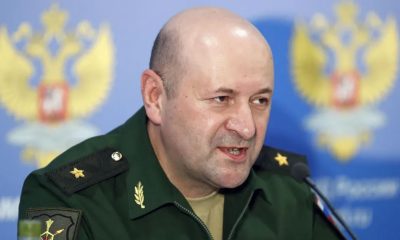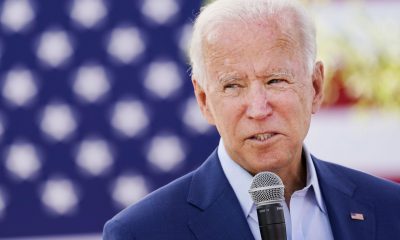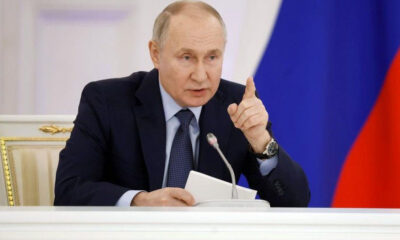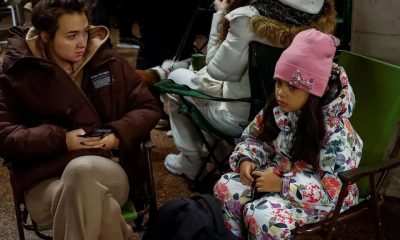International
Ukraine says will meet Russia as Putin puts nuclear defences on alert

The conflict has already killed dozens of civilians, forced hundreds of thousands to flee and turned Moscow into a global pariah.
President Volodymyr Zelensky’s office said a Ukrainian delegation would meet the Russian one at the border with Belarus, which has allowed Russian troops passage to attack Ukraine.
The meeting is set to take place near Chernobyl — the site of the world’s worst nuclear disaster.
“The politicians agreed that the Ukrainian delegation would meet the Russian one without preconditions,” Zelensky’s office said in a statement after the president spoke to his Belarusian counterpart Alexander Lukashenko.
Ukrainian forces earlier said they had fought off a Russian incursion into Ukraine’s second biggest city, Kharkiv, on day four of Russia’s invasion.
As Western countries lined up to send arms into Ukraine and impose ever more stringent sanctions, Putin ordered his defence chiefs to put the country’s nuclear “deterrence forces” on high alert.
Putin accused Western countries of taking “unfriendly” steps against his country.
Ukraine has reported 198 civilian deaths, including three children, since the invasion began.

© Thomson Reuters Demonstrators hold placards amongst others holding Ukrainian flags, during an anti-war protest, after Russia launched a massive military operation against Ukraine, at the Brandenburg gate in Berlin, Germany, February 27, 2022. REUTERS/Fabrizio Bensch
The UN has put the civilian toll at 64.
“The past night in Ukraine was brutal,” Zelensky said.
“They fight against everyone. They fight against all living things — against kindergartens, against residential buildings and even against ambulances.”
Airspace bans, arms pledges
Several European countries meanwhile banned Russian airlines from their airspace on Sunday and many pledged arms for Ukraine but made it clear that they will not intervene militarily.
In his traditional Sunday message to the faithful in St Peter’s Square, Pope Francis called for weapons to “fall silent” in the country and for the opening of humanitarian corridors.
A day after Berlin said it would send anti-tank weapons and Stinger missiles to Ukraine, German Chancellor Olaf Scholz said the world was in a “new era” and warned of further sanctions.
‘Will drive you crazy’
Machine gun fire and explosions were heard in Kharkiv earlier on Sunday and AFP later saw the wreckage of a Russian armoured vehicle smouldering and several others abandoned.
READ ALSO:
- Men should observe proper hygiene before having intercourse ― Juliet Ibrahim
- Police Arrest Five Wanted Cult Members In Ogun
- Don’t fall victim, verify lands before purchase, FG tells Lagos residents
“Kharkiv is fully under our control,” the head of the regional administration, Oleg Sinegubov, said on Telegram, adding that the army was expelling Russian forces during a “clean-up” operation.
Moscow also claimed it was “entirely” besieging the southern Ukrainian city of Kherson and the city of Berdyansk in the southeast.
Both are located close the Crimea peninsula, which Russia annexed from Ukraine in 2014.
Ukrainian officials also said that a gas pipeline in eastern Kharkiv and an oil depot near the capital Kyiv were targeted by Russian forces overnight.
Ukraine said it was fighting off Russian forces in several other points and that 4,300 Russian troops had been killed.
None of the claims could be independently verified.
In Kyiv, many residents spent another night in shelters or cellars as Ukrainian forces said they were fighting off Russian “sabotage groups”, but Sunday was relatively calm compared to previous days.
The city is under a blanket curfew until Monday morning though some residents ventured out regardless.
Out for a walk in a park, 41-year-old Flora Stepanova said staying at home watching the news all the time “will drive you crazy”.
On Saturday, Russia ordered its forces to advance further into Ukraine “from all directions” but soldiers have encountered fierce resistance from Ukrainian troops
Western sources said the intensity of the resistance seems to have surprised Moscow.
Ukraine’s army said it held the line against an assault on Kyiv, but was using the curfew to fight Russian “sabotage groups” that had infiltrated the city.
On Sunday, Ukraine’s general staff urged any foreigners to come to Ukraine “and fight side-by-side with Ukrainians against Russian war criminals”.
‘I was trembling’
The UN refugee agency (UNHCR) says more than 368,000 people have fled to neighbouring countries, while more than 160,000 are estimated to be displaced within Ukraine.
Pope Francis called for the “urgent” opening of humanitarian corridors for Ukraine to allow even more to leave.
AFP saw stationary queues of cars stretching for dozens of kilometres on the roads to Ukraine’s border crossings with Poland.
“Attacks were everywhere,” said Diana, 37, who fled the Ukrainian capital. “My mother is still in Kyiv.”
READ ALSO:
- NDLEA intercepts 649,300 capsules of Tramadol, over 809 Euro, others in Lagos
- Pastor shoots worshiper, arrested in Ogun
- Russia-Ukraine crisis: FG directs fleeing Nigerians to four Polish borders, over 100 escape war
Poland, Germany and Austria have said Ukrainians can ride for free on their trains until further notice.
In Romania, which also neighbours Ukraine, Olga, 36, was among hundreds to have crossed the Danube river with her three young children to safety.
“My husband came with us as far as the border, before returning to Kyiv to fight,” she said.
Crippling bank sanctions
Responding to the invasion, the West said it would remove some Russian banks from the SWIFT bank messaging system, and froze central bank assets — hitting some of Russia’s global trade.
A senior US official said the measures would turn Russia into a “pariah”, adding that a task force would hunt down Russian oligarchs’ assets.
The conflict has rattled particularly former Soviet satellite countries in Eastern Europe who fear their post Cold War democratic gains could be threatened by Russian aggression.
The NATO alliance has said it will, for the first time, deploy part of its rapid response force to the region to reassure eastern allies.
There have also been sanctions and boycotts in the cultural and sporting spheres as well as international travel, with several countries banning Russian airlines from their airspace.
In the latest punishment for Putin, a keen judoka, the International Judo Federation said he has been suspended as its honorary president.
The Kremlin has so far brushed off sanctions, including those targeting Putin personally, as a sign of Western impotence.
Putin has said Russia’s actions are justified because it is defending Moscow-backed separatists in eastern Ukraine.
In an address to parishioners on Sunday, Russia’s Orthodox Patriarch Kirill voiced his support, calling Moscow’s opponents “evil forces”.
The rebels have been fighting Ukrainian government forces for eight years in a conflict that has killed more than 14,000 people.
AFP
International
Syria not threat to world, rebel leader al-Sharaa tells BBC
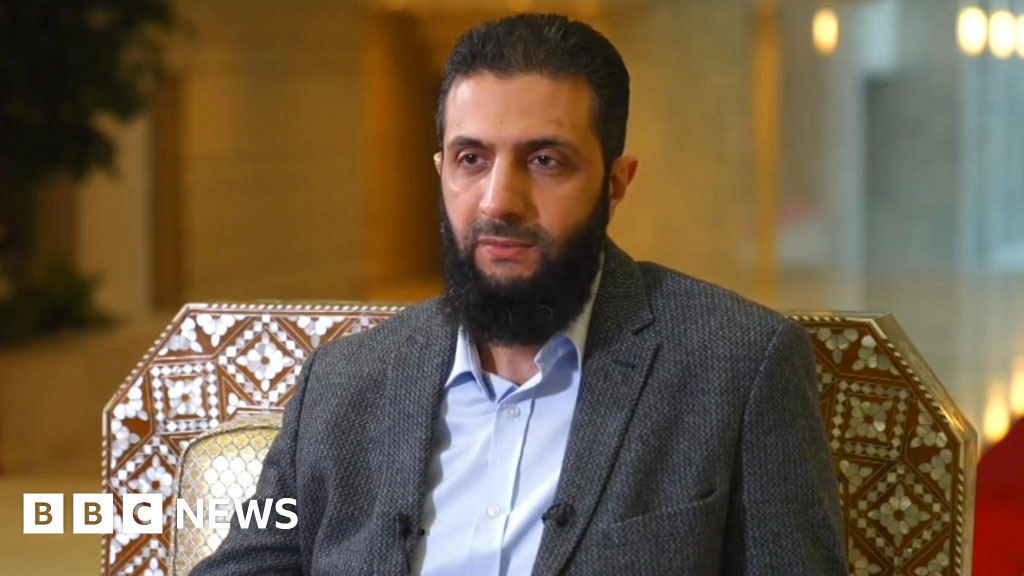
Syria not threat to world, rebel leader al-Sharaa tells BBC
The de facto leader of Syria, Ahmed al-Sharaa, has said the country is exhausted by war and is not a threat to its neighbours or to the West.
In an interview with the BBC in Damascus, he called for sanctions on Syria to be lifted.
“Now, after all that has happened, sanctions must be lifted because they were targeted at the old regime. The victim and the oppressor should not be treated in the same way,” he said.
Sharaa led the lightning offensive that toppled Bashar al-Assad’s regime less than two weeks ago. He is the leader of the Hayat Tahrir al-Sham (HTS), the dominant group in the rebel alliance, and was previously known by his nom de guerre of Abu Mohammed al-Jolani.
He said HTS should be de-listed as a terrorist organisation. It is designated as one by the UN, US, EU and UK, among many others, as it started as a splinter group of al-Qaeda, which it broke away from in 2016.
Sharaa said HTS was not a terrorist group.
They did not target civilians or civilian areas, he said. In fact, they considered themselves to be victim of the crimes of the Assad regime.
He denied that he wanted to turn Syria into a version of Afghanistan.
READ ALSO:
- Tinubu’s 2025 budget will increase poverty, worsen economy – PDP
- Real Madrid outclass Pachuca to win FIFA Intercontinental Cup
- Israel hits ports, energy sites in Yemen after missile intercepted
Sharaa said the countries were very different, with different traditions. Afghanistan was a tribal society. In Syria, he said, there was a different mindset.
He said he believed in education for women.
“We’ve had universities in Idlib for more than eight years,” Sharaa said, referring to Syria’s north-western province that has been held by rebels since 2011.
“I think the percentage of women in universities is more than 60%.”
And when asked whether the consumption of alcohol would be allowed, Sharaa said: “There are many things I just don’t have the right to talk about because they are legal issues.”
He added that there would be a “Syrian committee of legal experts to write a constitution. They will decide. And any ruler or president will have to follow the law”.
Sharaa was relaxed throughout the interview, wearing civilian clothes, and tried to offer reassurance to all those who believe his group has not broken with its extremist past.
Many Syrians do not believe him.
The actions of Syria’s new rulers in the next few months will indicate the kind of country they want Syria to be – and the way they want to rule it.
Syria not threat to world, rebel leader al-Sharaa tells BBC
BBC
International
Israel hits ports, energy sites in Yemen after missile intercepted
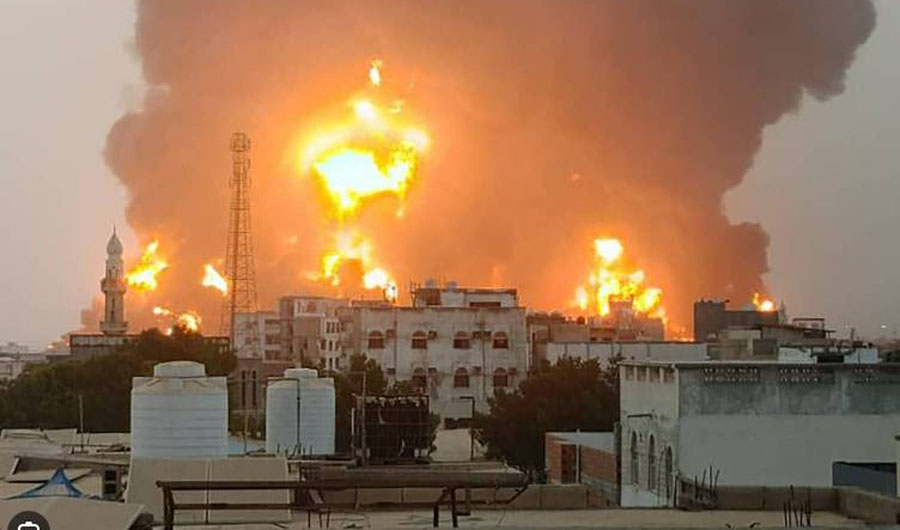
Israel hits ports, energy sites in Yemen after missile intercepted
JERUSALEM: Israel said Thursday it struck ports and energy infrastructure it alleges are used by Houthi militants, after intercepting a missile fired by the group.
Israel’s military said it “conducted precise strikes on Houthi military targets in Yemen — including ports and energy infrastructure in Sanaa, which the Houthis have been using in ways that effectively contributed to their military actions.”
The announcement came shortly after Israel said it had intercepted a missile fired from Yemen.
Al-Masira, a media channel belonging to the Houthis, said a series of “aggressive raids” were launched in the Yemeni capital of Sanaa and the port city of Hodeidah.
It reported raids that “targeted two central power plants” in Yemen’s capital Sanaa, while in Hodeidah it said “the enemy launched four aggressive raids targeting the port… and two raids targeting” an oil facility.
The strikes were the second time this week that Israel’s military has intercepted a missile from Yemen.
On Monday, the Houthis claimed a missile launch they said was aimed at “a military target of the Israeli enemy in the occupied area of Yaffa” — a reference to Israel’s Tel Aviv area.
READ ALSO:
- Gaza mediators intensify ceasefire efforts, Israeli strikes kill 20 people
- PDP expels South-East national vice chairperson over anti-party activities
- Your information on $1bn investment misleading, Dangote Refinery replies NNPCL
Also Monday, an Israeli navy missile boat intercepted a drone in the Mediterranean after it was launched from Yemen, the military said.
The Houthi militants have said they are acting in solidarity with Palestinians and pledged Monday to continue operations “until the aggression on Gaza stops and the siege is lifted.”
On December 9, a drone claimed by Houthis exploded on the top floor of a residential building in the central Israel city of Yavne, causing no casualties.
In July, a Houthi drone attack in Tel Aviv killed an Israeli civilian, prompting retaliatory strikes on the Yemeni port of Hodeidah.
The Houthis have also regularly targeted shipping in the Red Sea and the Gulf of Aden, leading to retaliatory strikes on Houthi targets by United States and sometimes British forces.
Israeli military spokesman Daniel Hagari said the group had become a “global threat,” pointing to Iran’s support for the militants.
“We will continue to act against anyone, anyone in the Middle East, that threatens the state of Israel,” he said.
Israel hits ports, energy sites in Yemen after missile intercepted
International
Gaza mediators intensify ceasefire efforts, Israeli strikes kill 20 people
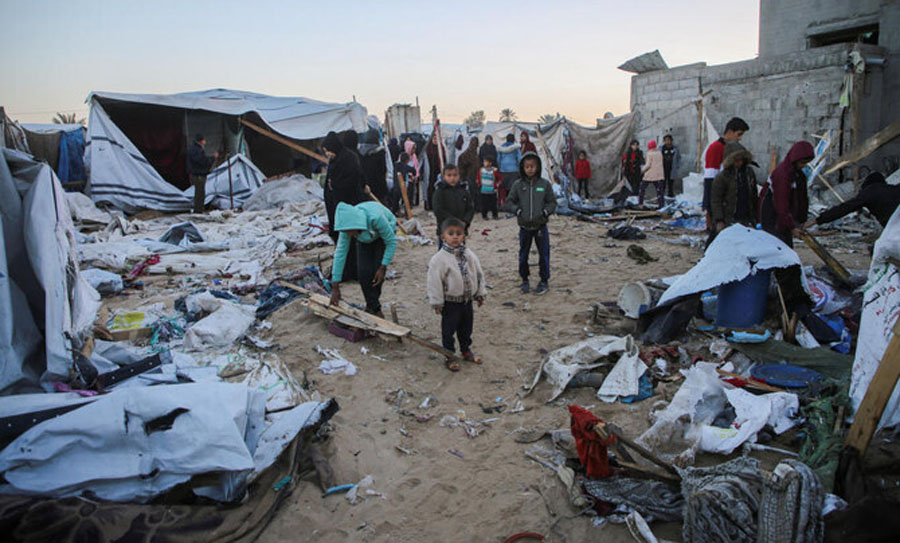
Gaza mediators intensify ceasefire efforts, Israeli strikes kill 20 people
CAIRO: The United States, joined by Arab mediators, sought on Wednesday to conclude an agreement between Israel and Hamas to halt the 14-month-old war in the Gaza Strip where medics said Israeli strikes killed at least 20 Palestinians overnight.
A Palestinian official close to the negotiations said on Wednesday that mediators had narrowed gaps on most of the agreement’s clauses. He said Israel had introduced conditions which Hamas rejected but would not elaborate.
On Tuesday, sources close to the talks in Cairo, the Egyptian capital, said an agreement could be signed in coming days on a ceasefire and a release of hostages held in Gaza in return for Palestinian prisoners held by Israel.
Medics said an Israeli airstrike killed at least 10 people in a house in the northern town of Beit Lahiya while six were killed in separate airstrikes in Gaza City, Nuseirat camp in central areas, and Rafah near the border with Egypt.
In Beit Hanoun in the northern Gaza Strip, medics said four people were killed in an airstrike on a house. There was no immediate comment from the Israeli military spokesman.
Israeli forces have operated in the towns of Beit Hanoun and Beit Lahiya as well as the nearby Jabalia camp since October, in a campaign the military said aimed to prevent Hamas militants from regrouping.
Palestinians accuse Israel of carrying out acts of “ethnic cleansing” to depopulate the northern edge of the enclave to create a buffer zone. Israel denies it.
READ ALSO:
- PDP expels South-East national vice chairperson over anti-party activities
- Your information on $1bn investment misleading, Dangote Refinery replies NNPCL
- Many die at Ibadan children’s Christmas party stampede, organisers arrested
Hamas does not disclose its casualties, and the Palestinian health ministry does not distinguish in its daily death toll between combatants and non-combatants.
On Wednesday, the Israeli military said it struck a number of Hamas militants planning an imminent attack against Israeli forces operating in Jabalia.
Later on Wednesday, Muhammad Saleh, director of Al-Awda Hospital in Jabalia, said Israeli shelling in the vicinity damaged the facility, wounding seven medics and one patient inside the hospital.
The Israeli military had no immediate comment.
In the Central Gaza camp of Bureij, Palestinian families began leaving some districts after the army posted new evacuation orders on X and in written and audio messages to mobile phones of some of the population there, citing new firing of rockets by Palestinian militants from the area.
CEASEFIRE GAINS MOMENTUM
The US administration, joined by mediators from Egypt and Qatar, has made intensive efforts in recent days to advance the talks before President Joe Biden leaves office next month.
In Jerusalem, Israeli President Isaac Herzog met Adam Boehler, US President-elect Donald Trump’s designated envoy for hostage affairs. Trump has threatened that “all hell is going to break out” if Hamas does not release its hostages by Jan. 20, the day Trump returns to the White House.
CIA Director William Burns was due in Doha on Wednesday for talks with Qatari Prime Minister Sheikh Mohammed bin Abdulrahman Al-Thani on bridging remaining gaps between Israel and Hamas, other knowledgeable sources said. The CIA declined to comment.
Israeli negotiators were in Doha on Monday looking to bridge gaps between Israel and Hamas on a deal Biden outlined in May.
There have been repeated rounds of talks over the past year, all of which have failed, with Israel insisting on retaining a military presence in Gaza and Hamas refusing to release hostages until the troops pulled out.
The war in Gaza, triggered by a Hamas-led attack on communities in southern Israel that killed some 1,200 people and saw more than 250 abducted as hostages, has sent shockwaves across the Middle East and left Israel isolated internationally.
Israel’s campaign has killed more than 45,000 Palestinians, displaced most of the 2.3 million population and reduced much of the coastal enclave to ruins.
Gaza mediators intensify ceasefire efforts, Israeli strikes kill 20 people
ARAB NEWS
-

 Railway23 hours ago
Railway23 hours agoLagos Rail Mass Transit part of FG free train ride – NRC
-

 metro2 days ago
metro2 days agoCourt stops customs from seizing imported rice in open market
-

 metro3 days ago
metro3 days agoFG transfers electricity market regulatory oversight in Lagos to LASERC
-

 metro2 days ago
metro2 days agoIbadan stampede: Tinubu orders probe as death toll hits 40
-

 metro2 days ago
metro2 days agoAfe Babalola: Court grants Dele Farotimi bail, barred from media interviews
-

 metro1 day ago
metro1 day agoIbadan stampede: Ooni reacts after arrest of ex-wife
-

 metro23 hours ago
metro23 hours agoNIMC warns against extortion, reaffirms free NIN enrollment
-

 metro4 hours ago
metro4 hours agoWhy we displayed ‘Jesus Christ is not God’ banner at Lekki mosque -Imam

